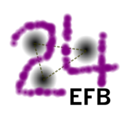Speaker
Description
We study properties of an interaction between two clusters within the resonating group method. Due to the Pauli principle, a cluster-cluster interaction is a nonlocal potential within the standard version of the resonating group method. We employed the algebraic version of the method, which involves a complete basis of oscillator functions to expand a two-cluster wave function. In the framework of the latter method, a nonlocal cluster-cluster interaction is represented as a matrix. Our main aim is to study properties of matrix of the potential energy operator generated by a nucleon-nucleon and Coulomb potentials. We construct the matrix with the full antisymmetrization and without antisymmetrization (folding potential). These two matrixes allow us to reveal explicitly the influence of the Pauli principle on the shape of the cluster-cluster interaction.
Eigenvalues and eigenfunctions of the folding cluster-cluster potential have been compared with those of the non-local cluster-cluster potential for the lightest nuclei of the $p$-shell: $^{5}$He, $^{5}$Li, $^{6}$Li, $^{7}$Li, $^{7}$Be and $^{8}$Be. All these nuclei are considered as two-cluster systems composed of an alpha particle and a nucleus of the $s$-shell. We employ the Minnesota potential, the modified Hasegawa-Nagata potential and Volkov N2 potential to investigate the dependence of cluster-cluster interaction on the shape of the potential.
It is demonstrated that eigenvalues of the folding two-cluster potential coincide with the potential energy in coordinate space at some specific discrete points. It is also shown that the eigenfunctions of the folding potential energy matrix are the expansion coefficients of the spherical Bessel functions in a harmonic oscillator basis.
In general, the eigenvalues of the folding and exact cluster-cluster potential do not diverge considerably. However, the dependence of the exact cluster-cluster potential on the number of the invoked functions reveals a number of resonance states which are absent in the case of folding potential. The structure of the resonance states is much different from the eigenfunctions of the folding potential. Such resonance states are mainly localized in the region of small number of quanta in discrete space and, consequently, in the region of small distances between clusters in coordinate space.




